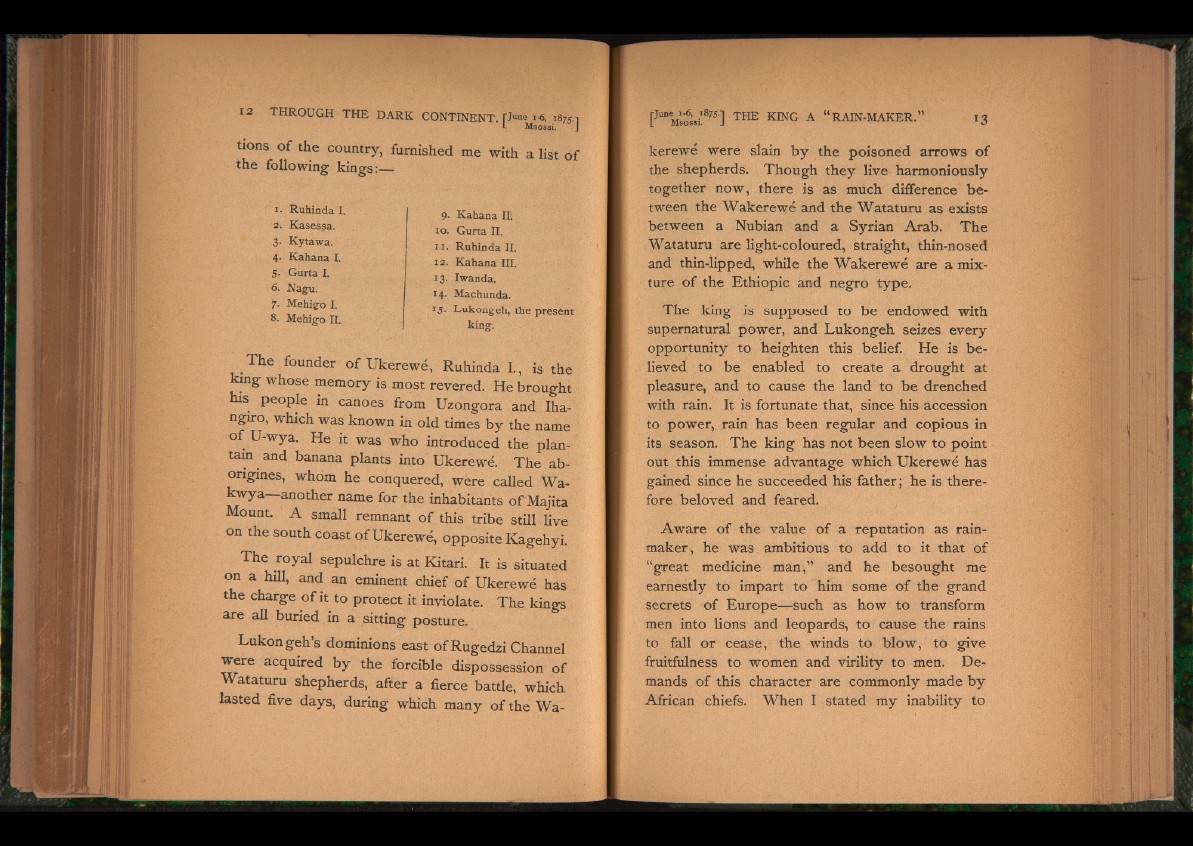
tions o f the country, furnished me with a list o f
the following kings:_
1. Ruhinda I,
2. Kasessa.
3. Kytawa.
4- Kahana I.
5. Gurta I.
6. Nagu.
7- Mehigo I.
8. Mehigo H.
9. Kahana II.
10. Gurta II.
11. Ruhinda II.
12. Kahana III,
13. Iwanda.
14. Machunda.
15- Lukongeh, the present
king.
T h e founder o f Ukerewe, Ruhinda I., is the
king whose memory is most revered. He brought
his people in canoes from Uzongora and Iha-
ngiro, which was known in old times b y the name
o f U-wya. He it was who introduced the plantain
and banana plants into Ukerewe. T he aborigines,
whom he conquered, were called Wa-
kw y a— another name for the inhabitants o f Majita
Mount. A small remnant o f this tribe still live
on the south coast o f Ukerewe, opposite Kagehyi.
T he ro y a l sepulchre is at Kitari. It is situated
on a hill, and an eminent chief o f Ukerewe has
the charge o f it to protect it inviolate. The kings
are all buried in a sitting posture.
L u k on g eh ’s dominions east ofR u g ed zi Channel
were acquired b y the forcible dispossession o f
Wataturu shepherds, after a fierce battle, which
lasted five days, during which many o f the Wa-
[JunMsosSi!875'] THE KING A “ RAIN-MAKER.”
kerewe were slain b y the poisoned arrows o f
the shepherds. Though th ey live harmoniously
together now, there is as much difference be tween
the Wakerewe and the Wataturu as exists
between a Nubian and a Syrian Arab. T he
Wataturu are light-coloured, straight, thin-nosed
and thin-lipped, while the Wakerewe are a mixture
o f the Ethiopic and negro type.
The king is supposed to be endowed with
supernatural power, and Lukongeh seizes every
opportunity to heighten this belief. He is believed
to be enabled to create a drought at
pleasure, and to cause the land to be drenched
with rain. It is fortunate that, since his accession
to power, rain has been regular and copious in
its season. T h e king has not been slow to point
out this immense advantage which Ukerewe has
gained since he succeeded his father; he is therefore
beloved and feared.
Aw a re o f the value o f a reputation as rainmaker,
he was ambitious to add to it that o f
“great medicine man,” and he besought me
earnestly to impart to him some o f the grand
secrets o f Europe— such as how to transform
men into lions and leopards, to cause the rains
to fall or cease, the winds to blow, to give
fruitfulness to women and virility to men. De mands
o f this character are commonly made b y
African chiefs. When I stated my inability to